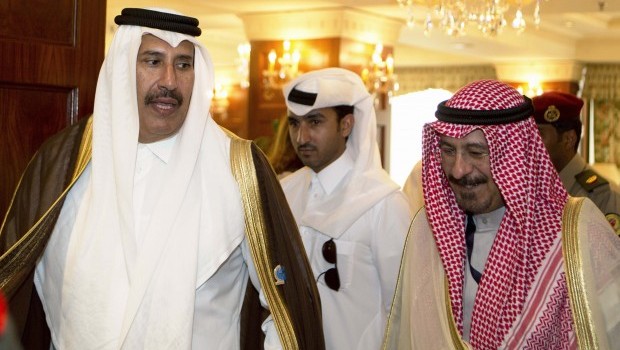At the opening session of the first International Conference Of Council for Arab and International Relations in Kuwait, Qatar’s prime minister put forward several ideas that are worthy of discussion. The most prominent of these were his proposal to create a cooperative Gulf organization of states including Iran, his call for a media free from checks and balances, and his assertion that reform should not come about in the form of a revolution or an uprising.
Of course, you could write an article about every idea put forward by Sheikh Hamad bin Jassim, but it does no harm to have a quick discussion here. Firstly, let us address his proposal for Iran to be included in a future Gulf organization. This is strange, especially as the Gulf, and the wider region, is calling for Iran to take its hand out of our countries. Furthermore, Tehran is facing mounting international pressure, including with regards to its nuclear file, so should we really be trying to rescue Iran now, rewarding it for what it is doing in Syria for example? Sheikh Hamad in turn justified his proposal by saying that outstanding issues with Iran can be resolved through constructive dialogue, pursuing diplomatic means, and strengthening confidence away from heavy-handedness. This is true, but was it not Sheikh Hamad who also said, according to WikiLeaks documents, that relations with Iran are based on the principle of they lie to us, and we lie to them? What has changed? As for saying that reform should not come in the form of a revolution or an uprising, but rather it should be a gradual process, there is no doubt here. This is what we and the wise, although there are few of them, have been saying since the beginning of the Arab Spring, although Syria is an exception because it is a genuine revolution. Nevertheless, we have been exposed to the harshest expressions of mistrust and insults for saying so. So has Qatar’s political thinking changed, with the realization that it is a mistake to pour fuel on the fire and inflame the street, or is there something else at play here, especially since Doha has hosted several opposition conferences and personalities, and its media still invites some of the main instigators of the Arab Spring? As one thing leads to another, Sheikh Hamad also said that whenever the media is allowed to perform its role without checks and balances, we increase our understanding of the world, and in turn we receive greater respect for our issues.
Yet this goes against one of the main principles of reform and freedom, namely responsibility. How can there be a media without checks and balances? Why not do the same with economic markets, traffic systems, and so on? Sheikh Hamad is well aware that the societies we want to respect us have strict media controls, on the basis of responsibility.
The West, for example, criminalizes hate speech, and holds even football fans accountable for their chants. Likewise, social networking users can be prosecuted if they promote lies or slander, and social media terms and conditions in the West are harsher than most of the laws regulating the media in our region. The Western media operates in accordance with a system of strict rules and conventions that ensures its credibility and independence. If we applied such measures in our region, many media outlets would go out of business, and the situation would be even worse if we had to earnestly respect intellectual property rights, but this is another story.
I will conclude by saying that regardless of my opinions, Sheikh Hamad has put forth a series of issues to spark a serious debate, and this in itself is commendable.
